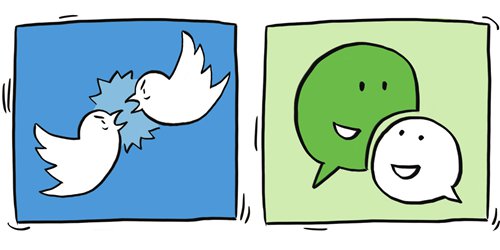
Illustration: Liu Rui/GT
Today, social media has become a soapbox for people to state their views on society, politics and religion. Recently, the Charlottesville protest has caused a huge stir on Facebook. I can't even scroll through without seeing harsh words and posts from either side. One person even vented his anger on friends who had said nothing for or against what happened. He said that noticing the lack of non-minorities speaking out against the actions in Charlottesville makes him question the "poor choice of people" he associates with. He even posted a quote from Holocaust survivor and political activist Elie Wiesel, "Always take sides. Neutrality helps the oppressor, never the victim."
On the other hand, I had a friend who posted an article against the actions of the alt-right, and people condemned her for being biased. When she confronted the person who commented, asking him to explain why he felt that way, he messaged her privately, explaining that the alt-left were just a bunch of "cry babies," and that if they had stayed out of it the conflict would not have happened. While she didn't agree, she said that she at least appreciated hearing his side rather than just having an argument on open-forum comments through a Facebook feed.
When it comes to religion and politics on social media, one faces a lose-lose situation. You are crucified if you do stand up and crucified if you don't.
One major difference I have noticed in China is how people use WeChat's Moments. It is less fueled by politics and more by food, fun and travel. While I do appreciate that people are able to voice their opinions and share what they believe, I don't think that social media is always the best place for that.
Social media was developed to keep us more connected with family and friends and to create a platform for sharing photos and experiences that we would otherwise not be able to share with people when we are far from home or those who we are not easily connected with.
When speaking to a colleague about the matter, he agreed and said, "If anything, social media helps polarize and radicalize beliefs because it condenses them into cherry-picked small packages of alluring sermons designed to convert people to extreme views. It's also easier to fabricate things on social media as it lacks the fact-check mechanism of reputable media outlets."
When scrolling through social media, you are also more likely to see things that support your own point of view. This is because we tend to surround ourselves with people who share our own beliefs, which in turn causes us to see one side of a story or an event more prominently than the other.
My colleague also said, "Shallow and unreliable by nature, social media is not best-equipped to advance any serious discussion about politics and religion in a constructive and meaningful way."
In reality, most people will not change their minds through a battle on social media. Usually, it is just one side attacking another until it comes to a standstill or devolves into name calling and personal insults.
In today's age, it is hard to decide what to do in situations like these. Even with WeChat, one must be careful when posting information related to personal beliefs and politics.
You don't know if your boss or coworkers may see your post and think negatively of you or treat you differently because of your beliefs. Even though it shouldn't happen, it does. That's why people have become more and more aware of privacy settings on social media accounts.
I can personally say that I have judged people on things that they have posted on Facebook or WeChat, and if I was hiring or deciding if I wanted to start a relationship, be it friendly or romantic, a person's posts have an impact on my impression of them.
In addition, many of the people who were involved in the Charlottesville protests were fired from their jobs because they were spotted on footage and pictures at the event supporting the alt-right or carrying Nazi symbols during the protests.
In today's digital age, you cannot easily hide in a crowd or get away with things that you could have in the past. This is why I personally choose to stay out of politics and religion online.
There is a common rule in the US that there are two things you don't talk about at family gatherings to keep the peace - politics and religion. I will carry that over into my social media presence as well.
The author is an editor with the Global Times. opinion@globaltimes.com.cn
